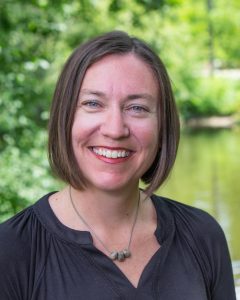
Kendra Cheruvelil, 2018-19 Big Ten Academic Alliance Academic Leadership Program Fellow
Kendra Spence Cheruvelil is an independent person who enjoys being part of a team. I especially love to solve problems,
scientific or otherwise, by facilitating connections among people with different backgrounds, skills, and
expertise. I attribute these characteristics to my childhood in rural central Massachusetts where I spent my
home life exploring nature on my own and my school life participating in sports and clubs, as well as
working a variety of customer-service related part-time jobs starting at age 15. These experiences taught
me to organize and prioritize tasks, and carefully manage time. These skills served me well when I
entered the world of academia, first as a student and then as a faculty member.
I experienced a variety of academic settings that influenced my career trajectory. I earned my B.S. from a
liberal arts university (the University of Rochester), earned my M.S. and Ph.D. from our own researchintensive
institution (MSU), and then started my tenure-stream faculty career at a small commuter campus
(Purdue University North Central; PNC). Although I enjoyed my teaching and learning experiences at
PNC, I missed research and a diverse academic community. Therefore, I returned to MSU as part of LBC-
– the residential college for studying sciences in their historical, societal, and philosophical contexts.
During the past dozen years, I have taught relatively small classes of highly-motivated science
undergraduate students in an interdisciplinary residential setting. Concurrently, I have established a
research program in the Department of Fisheries and Wildlife. This situation suits me perfectly–I
experience a daily setting similar to what I experienced as an undergraduate at a liberal arts university,
while maintaining a high-profile collaborative research program.
Over the past few years, I have come to realize that although I enjoy teaching and research, what I find
most fulfilling is to empower others to reach their full research and teaching potential. For example, as
Founding Director of LBC’s Scholarship of Undergraduate Teaching and Learning Graduate Fellowship
Program, I have the opportunity to share my passion for the scholarship of teaching and learning with the
next generation of teacher-scholars. I also reap benefits each time I give a workshop about ‘creating,
implementing, and assessing student research teams’ or ‘cultivating an inclusive classroom’ to a group of
students and faculty. Just last week, I had an amazing conversation with some early career scholars about
white male privilege and how each and every one of us plays an important role in our campus climate.
This is not a conversation I could have had in my biology classroom of 100, but it is so very important
and has the potential to positively impact many-fold more students.
On the research front, I mentor the undergraduate, graduate, and post-doctoral researchers in my lab to
push and cross boundaries. For example, we push normative boundaries by employing the cultures and
practicing of team science and open science in ecology. And, we cross disciplinary boundaries by
collaborating with computer scientists to create knowledge that is novel for both computer science and
ecology. In my position as Associate Dean for Research and Faculty Development, I now have the
opportunity to help foster the creativity and productivity of my LBC colleagues. When does one
experience a bigger reward than when a student or colleague successfully takes the next step on their
chosen career path?
Since leaving my rural town of 1100, I have sought out experiences to better understand and include all
people. For example, I became a certified facilitator for the MSU LBGTQ Resource Center, I helped
found LBC’s inclusion committee, and I participated in a three-day CANR inclusion workshop (Opening
Doors). However, trainings do not change institutional culture—people coming together with a shared
vision, goals, and resources change institutional culture. As an MSU leader, I am prepared for the
marathon of work that lies ahead for our students, staff, faculty, and administrators to align MSU’s
policies, practices, and cultures. Helping to lead institutional change that creates a campus of respect and
value for all human beings would be the utmost reward I could ever expect.

